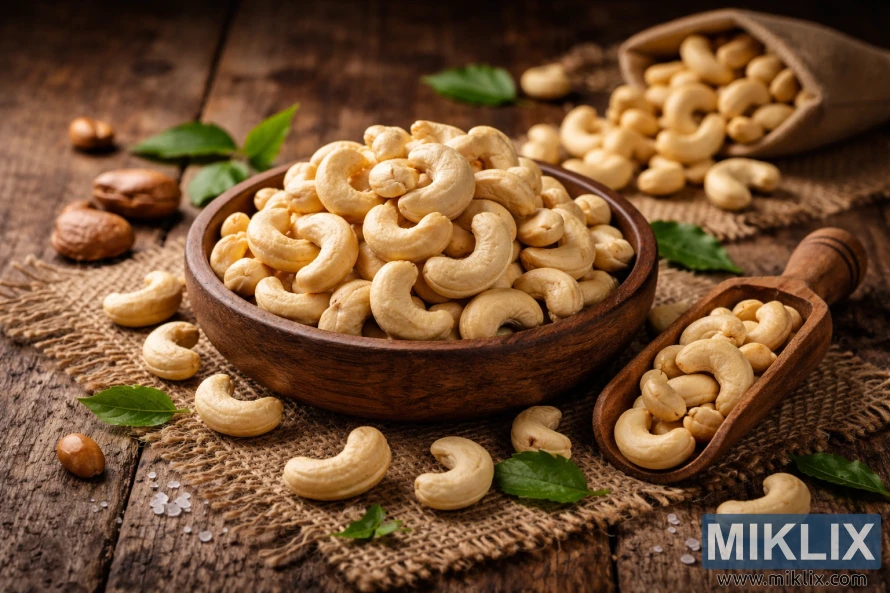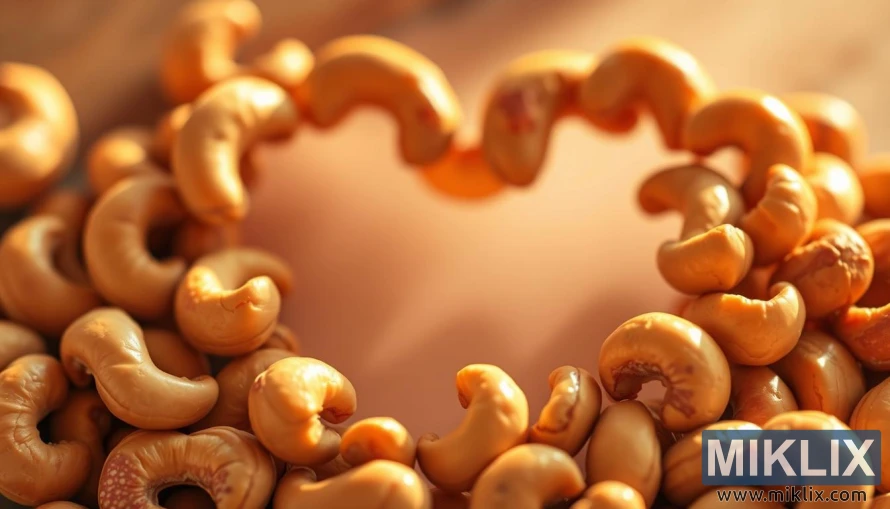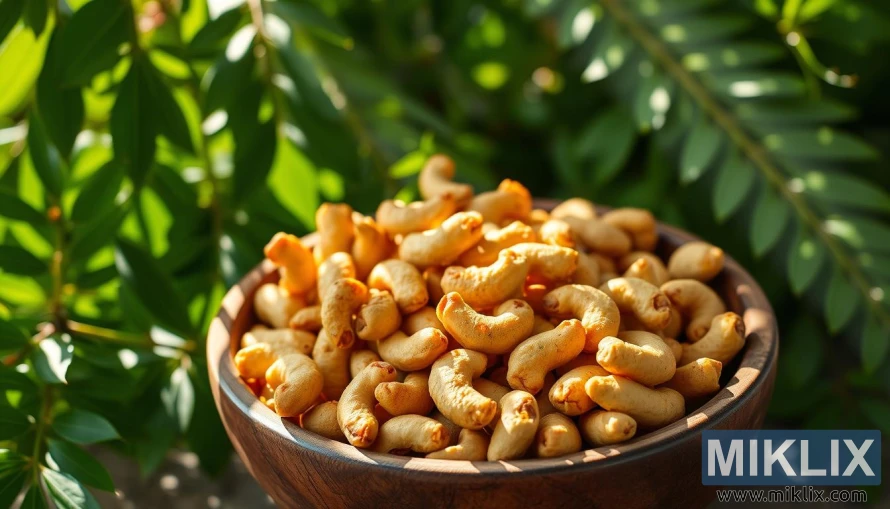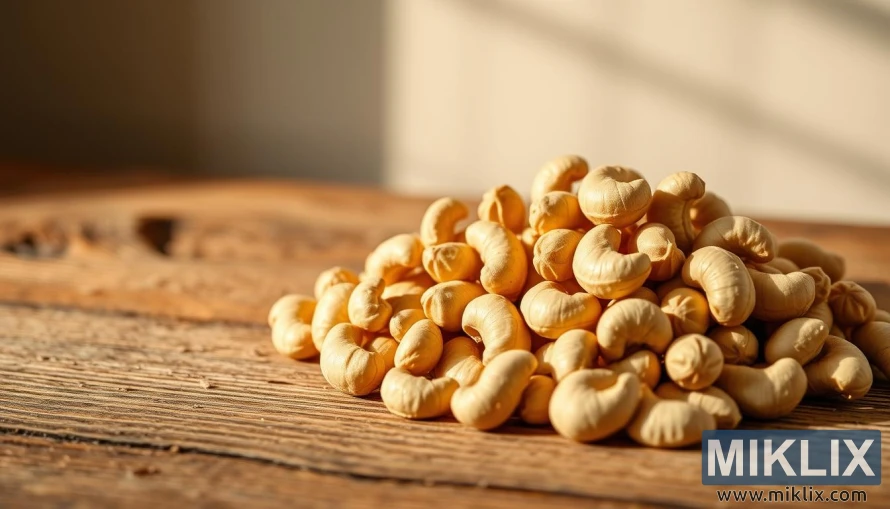Cashews Uncovered: The Tasty Way to Boost Your Well-Being
Published: May 20, 2025 at 11:56:13 AM UTC
Last updated: December 24, 2025 at 12:29:49 PM UTC
Cashew nuts are more than just a tasty snack. They are full of health benefits backed by science. With their rich flavor and crunchy texture, cashews bring many advantages to your diet. This article will explore how cashew nuts support heart health, help with weight management, and control blood sugar levels.

Key Takeaways
- Cashew nuts offer a wealth of health benefits, including heart health support.
- They are rich in healthy fats, protein, and essential vitamins and minerals.
- Incorporating cashews into your diet may aid in weight management.
- Cashew nuts can potentially improve blood sugar control.
- They are versatile and can be used in a variety of culinary applications.
- Understanding the nutritional value of cashews can enhance your overall health.
What Are Cashew Nuts?
Cashew nuts come from the cashew apple, a fruit of the cashew tree. This tree is originally from Brazil but is now grown worldwide. They have a rich, nutty taste, enjoyed raw or roasted.
Even though they're called nuts, cashews are actually seeds. This makes them special in cooking.
The cashew anatomy includes the nut and the cashew apple, a juicy fruit. But, the cashew nut has a toxic oil, like poison ivy. This oil is removed when heated, making them safe to eat.
Knowing about the cashew tree and its nuts helps us appreciate their deliciousness and versatility.
Nutritional Profile of Cashew Nuts
Learning about cashew nuts nutrition is key for those wanting to add them to their diet. A 1-ounce (28-gram) serving has about 157 calories. It's a great snack. Here's what you get in that serving:
- 5 grams of protein
- 12 grams of mostly unsaturated fat
- 9 grams of carbohydrates, inclusive of 1 gram of fiber
Cashews are packed with important minerals. They have 69% of the daily copper value. They also offer 20% of magnesium, plus zinc and iron. These help with energy, bone health, and boosting the immune system.
Health Benefits of Cashew Nuts
Eating cashew nuts regularly can greatly improve your health. They are packed with healthy fats, fiber, and vitamins and minerals. This makes them very nutritious.
One key benefit is for your heart. Studies show that eating cashews can help keep your heart healthy. They can improve your cholesterol levels.
For those trying to manage their weight, cashews are helpful. They have protein and healthy fats that make you feel full. This can help you eat less and stay on a healthy diet.
They also help control blood sugar levels. This is good for people who want to keep their health in check.
Learning about the health benefits of cashew nuts can help you see how they can improve your diet. They are a great addition to a healthy lifestyle.
Rich in Antioxidants
Cashew nuts are full of antioxidants, which are key for staying healthy. They have lots of polyphenols and carotenoids. These help fight oxidative stress and inflammation.
Eating cashews can help protect your cells from damage. This damage is linked to many diseases. So, adding cashews to your diet can boost your overall health.
The antioxidants in cashews might help protect against oxidative stress. Studies show they could lower the risk of chronic diseases. Even though more research is needed, the current evidence is promising.
Roasted cashews might have even more antioxidants than raw ones. This makes them a great choice for those wanting to improve their health. Adding cashews to your diet can be a tasty way to support your body's defenses.
May Aid in Weight Management
Many think nuts like cashews make you gain weight because of their calories. But, research suggests they might actually help with weight loss. This is because they aren't fully digested, which could lower their calorie effect.
Cashews are packed with protein and fiber. These nutrients help you feel full for longer. This makes them great for snacking, helping you avoid eating too much. Adding cashews to your diet can be a clever way to keep your weight in check.
Supports Heart Health
Eating cashews can greatly benefit your heart. These tasty nuts help control cholesterol levels. Studies show that eating cashews can lower bad cholesterol and raise good cholesterol. This balance is key for a healthy heart.
Also, a diet with cashews can help lower blood pressure. Lower blood pressure means a lower risk of heart diseases. Cashews are rich in magnesium, which helps the heart work well and keeps you healthy.

May Improve Blood Sugar Control
Cashew nuts are becoming a great choice for better blood sugar control. They have low carbs and lots of fiber. These help keep blood sugar stable after eating, making them a good snack.
Studies show that eating cashews can make your body more sensitive to insulin. This is key for managing diabetes. It helps people with type 2 diabetes stay healthier.
Adding cashews to your meals is simple. They're great in salads, smoothies, and as a creamy base in recipes. Enjoying them can help manage blood sugar levels.
Potential Benefits for Type 2 Diabetes
Studies show that adding cashew nuts to your diet can help manage cashew benefits diabetes. They help lower insulin levels and control blood sugar. This makes them great for people with type 2 diabetes.
Cashew nuts are low in sugar but high in fiber. They're perfect for a quick snack. They replace bad carbs that raise blood sugar. Cashews have healthy fats, proteins, and fiber, which slow digestion and keep you full.
Integrating cashews into your meals can help keep blood sugar stable. They also provide important nutrients for health. Choosing nutritious snacks like cashews is a smart move for managing type 2 diabetes.
Culinary Versatility of Cashew Nuts
Cashew nuts are loved by many for their taste and texture. They add richness to salads, stir-fries, and even pastries. Whether raw or roasted, they bring a special touch to any meal.
Using cashews in cooking can make simple dishes stand out. They're great for making creamy sauces that add a luxurious feel to pasta or veggies. They're also a key ingredient in dairy-free cheese, perfect for those cutting down on dairy.
Cashews are not just for main courses. They're also good in smoothies, on breakfast bowls, or in desserts. Their versatility makes them a favorite in many kitchens, catering to different tastes and dietary needs.

Potential Downsides of Cashew Consumption
Cashews can be a tasty snack for many, but there are risks to consider. For people with an allergy to cashews or other tree nuts, even a small amount can cause severe reactions. Symptoms include itching, swelling, and in extreme cases, anaphylaxis. It's important for those affected to stay away from cashews.
Also, while cashews are nutritious, eating too much can lead to too many calories. They are high in energy and can cause weight gain if eaten in large amounts. To enjoy cashews safely, it's key to eat them in moderation. Choosing unsalted, dry-roasted, or raw varieties helps avoid added oils and salts found in salted or roasted ones.
Planning the right portion sizes can help you enjoy the benefits while avoiding risks. Keeping an eye on how much you eat helps you maintain a balanced diet. This way, you can safely add cashews to your meals.
How to Include Cashew Nuts in Your Diet
Adding cashews to your meals can make them tastier and healthier. They fit well in many dishes. Try adding them to trail mixes for a quick snack. Or sprinkle them on salads for a creamy touch.
Looking for healthy snacks? Cashews are great on their own or with dried fruits. This mix satisfies hunger and offers a good mix of nutrients. Use cashew butter on toast or in oatmeal and yogurt for extra creaminess.
Here are some tips for using cashews in meals: blend them into smoothies for extra nutrition. Roast them with spices to make a tasty topping for rice or veggies. Use their versatility to make meals that are both interesting and healthy.
The Role of Cashew Nuts in Vegan Diets
Cashew nuts are key in a vegan diet. They are full of healthy fats and plant-based protein. These keep you energized and well-nourished. Their creamy texture is perfect for many recipes, like dairy substitutes.
Vegan cooks love using cashews for tasty, dairy-free dishes. They make creamy cheese and desserts. Cashews add flavor and a creamy feel, making dishes special without animal products.
Adding cashews to your pantry opens up many cooking options. You can enjoy them alone or use them in sauces, smoothies, and snacks. They make vegan eating fun and fulfilling.

Cashew Butter and Cream Alternatives
Cashew butter and cream are great dairy substitutes that make food taste better. Cashew butter is made by grinding roasted cashews into a smooth paste. It's full of healthy fats, vitamins, and minerals, making it good for you.
Looking for creamy textures without dairy? Try cashew cream recipes. Blend soaked cashews with water to get a smooth, creamy mix. Use it in soups, sauces, or desserts for a plant-based twist.
Using cashew butter and cream as dairy alternatives is good for your health. They let you enjoy tasty meals without dairy. This way, you get to enjoy rich flavors while sticking to a plant-based diet.
Storage Tips for Cashew Nuts
Storing cashew nuts right is key to keeping their taste and health benefits. Store them in an airtight container to keep air out. This stops them from going bad. Keep the container in a cool, dry spot, away from heat and moisture.
For longer storage, think about refrigeration or freezing. These are top ways to stop cashews from getting rancid. When freezing, use containers safe for the freezer and seal them well to keep them fresh.
Here are some helpful cashew keeping tips to keep in mind:
- Keep cashews away from sunlight to avoid overheating.
- Label your storage containers with the date of purchase for easier monitoring.
- Only open the container when you are ready to consume, to minimize exposure to air.
By following these storing cashew nuts tips, you can enjoy their rich flavor and health benefits for much longer.
Conclusion
Cashews are packed with nutrients that boost your health. They help your heart, manage weight, and control blood sugar. Adding them to your meals is both tasty and good for you.
They're great for snacking too. Cashews offer a crunchy texture and meet your nutritional needs. You can enjoy them raw, roasted, or in creamy sauces. Just remember to eat them in moderation.
Adding cashews to your diet is a smart choice. They taste great and offer many health benefits. Try them on salads, in smoothies, or as a quick snack for a nutritious boost!

Further Reading
If you enjoyed this post, you may also like these suggestions:
- Kimchi: Korea’s Superfood with Global Health Benefits
- From Hummus to Health: How Chickpeas Fuel a Healthy Life
- From Root to Remedy: How Beets Boost Your Health Naturally
